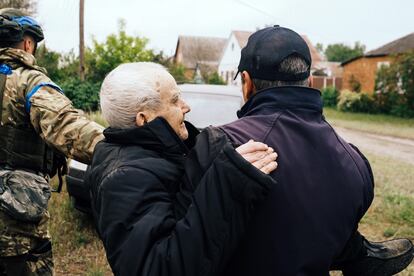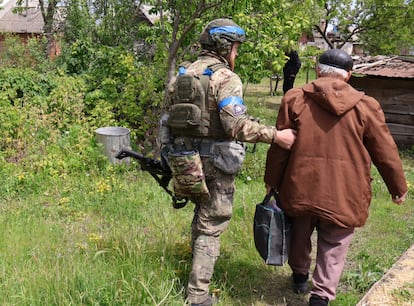Mission in Vovchansk: A race into hell in Ukraine to save four lives
EL PAÍS accompanies a Ukrainian police special operations unit in a civilian evacuation operation in a town north of Kharkiv besieged by Russian troops


The dogs fleeing from Vovchansk are nervous and trembling. Watching them is a way to understand that in this town in the north of the Ukrainian province of Kharkiv, on the border with Russia, the gates of hell have opened. The pets are evacuated with their owners to a shelter a few miles outside of town. They are humble people from an area that is facing the second major Russian offensive in more than two years of war. A resident gets out of a van with blood in his ears and nose, which is broken. An explosion a few meters away has left him scarred, perhaps for life.
Vovchansk is the main target of a new Russian lightning military campaign launched on May 10. It is of particular strategic interest to the Kremlin because its urban center would be ideal for concentrating troops for a future advance towards Kharkiv, Ukraine’s second-largest city. Last Thursday there were only around 300 inhabitants remaining in Vovchansk, from a pre-war population of some 17,000. There is now only room for death in the town, and in the neighboring villages. The esplanade where rescued civilians were arriving was attacked on the evening of May 16 with Russian cluster munitions: five people were wounded, including the mayor, Tamaz Gambarashvili.
It was not the first multiple explosion heard bearing the characteristic sound of cluster bombs, a weapon banned in over 100 countries because of its lethality in urban areas with civilian populations. The EL PAÍS team and other journalists had had to leave the same place on Wednesday because the Ukrainian army intercepted a radio communication from Russian forces transmitting the coordinates of the location to be bombed. The attack took place the following day.
Columns of smoke rise on the horizon from multiple villages, but it is in Vovchansk where the clatter of rifles, the roar of artillery, fire and ash forebode the complete destruction of the municipality, as was the case previously in Bakhmut, Chasiv Yar, and in so many other Ukrainian towns and villages. The families evacuating cry, their fate uncertain, while the police identify them and provide them with food from the NGO World Central Kitchen. Desperation is also evident in a man arrested while being evacuated carrying four large bags in which he was hiding dozens of products stolen from abandoned stores. The police inform him that he will be transferred to the military recruiting office to be enlisted into the army.
Oleksi Kharkivskii, head of a Ukrainian police special operations unit, prepares the next civilian extraction mission. With the help of local residents he locates two houses on a map, where an elderly man and a married couple and their child live. Together with Kharkivskii and his men, the Kharkiv Media Hub and the special envoy of EL PAÍS enter Vovchansk. Before the convoy departs, an SUV carrying four members of the Ukrainian military assault forces bursts onto the scene.
On the access road to Vovchansk, the same one that Kharkivskii’s team will take moments later, the soldiers were targeted by a Russian drone bomb, which exploded in front of the vehicle, damaging the radiator. The four soldiers get out of the vehicle, adrenaline pumping, check each other for wounds — two of them have superficial grazes — and then hug each other: they have escaped death by a whisker.
The two evacuation vehicles speed their way along a country road toward Vovchansk at 100 miles per hour. The main access road to the village is blocked by a burnt-out Ukrainian tank. Next to it lies a destroyed U.S.-produced infantry vehicle. The houses and flowerbeds along the street are smoking from recent shelling. Rounding a bend — where the Russian army knows that vehicles must slow down — a howitzer round hits within 50 meters of the two cars.

Discussion under the bombs
The Nikolin family refuses to leave Vovchansk. Their house is modest and the interior is a mess. On the kitchen table are the remains of a frugal breakfast, the last meal they will have at home. The mother confronts Kharkivskii because they don’t want to be evacuated. She says her 14-year-old son doesn’t want to leave. At the same time, a few hundred meters away in an adjacent field, several Russian grad rockets explode.
Fresh plumes of smoke rise above the row of trees in the street outside and after 15 minutes of discussion, the Nikolins agree to leave. A member of the rescue party would later explain to this newspaper that the family is “pro-Russian,” like many others who decide to remain in the region: “The police have been told that if they leave, the city will be occupied by the banderistas,” he says, using a common expression in Russia to refer to followers of the 1930s Ukrainian ultranationalist leader Stepan Bandera.
Loading up the family’s belongings, including caged barnyard animals, does not take more than 15 minutes. The main problem is trying to control two of the Nikolins’ dogs — who have been driven mad by the explosions and the presence of armed strangers — to get them into the vehicles. One of them repeatedly bit this newspaper’s correspondent, who was later treated by the medical services. One of Kharkivskii’s men watches from the street for the possible appearance of Russian drones. Hearing one of these devices approaching, the police issue the order to evacuate immediately.
The escape from Vovchansk was the same as the arrival: a race at breakneck speed, accompanied by more explosions, the panting of dogs, the mother’s screams and the teenager’s sobs. Once out of their village, the Nikolins unloaded their possessions and their animals at the evacuee reception point. Disoriented by the experience, they said they did not know where they would live from now on. A van was waiting to take them 15 miles away to the city of Kharkiv.
Sign up for our weekly newsletter to get more English-language news coverage from EL PAÍS USA Edition
Tu suscripción se está usando en otro dispositivo
¿Quieres añadir otro usuario a tu suscripción?
Si continúas leyendo en este dispositivo, no se podrá leer en el otro.
FlechaTu suscripción se está usando en otro dispositivo y solo puedes acceder a EL PAÍS desde un dispositivo a la vez.
Si quieres compartir tu cuenta, cambia tu suscripción a la modalidad Premium, así podrás añadir otro usuario. Cada uno accederá con su propia cuenta de email, lo que os permitirá personalizar vuestra experiencia en EL PAÍS.
¿Tienes una suscripción de empresa? Accede aquí para contratar más cuentas.
En el caso de no saber quién está usando tu cuenta, te recomendamos cambiar tu contraseña aquí.
Si decides continuar compartiendo tu cuenta, este mensaje se mostrará en tu dispositivo y en el de la otra persona que está usando tu cuenta de forma indefinida, afectando a tu experiencia de lectura. Puedes consultar aquí los términos y condiciones de la suscripción digital.








































